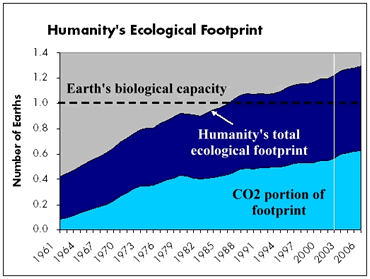An ecological footprint is a calculation of the amount of bioproductive land and water required to sustain the way we live, usually in hectares or acres.
The Earth’s biocapacity is the amount of biologically productive area cropland, pasture, forest, and fisheries that is available to meet humanity's needs.
When the pace of human consumption and waste generation is greater than the Earth’s biocapacity, we are in overshoot and biodiversity suffers.
In 2003 the global Ecological Footprint was 14.1 billion global hectares, or 2.2 global hectares per person (a global hectare is a hectare with world-average ability to produce resources and absorb wastes). The total supply of productive area, or biocapacity, in 2003 was 11.2 billion global hectares, or 1.8 global hectares per person.
For three decades now we have been in overshoot as the earth's ecological footprint is larger than its biocapacity, depleting our assets and increasing the amount of carbon dioxide (CO2) in the air. We cannot remain in overshoot much longer without depleting the planet’s biological resources and interfering with its long-term ability to renew them.



